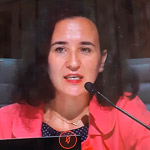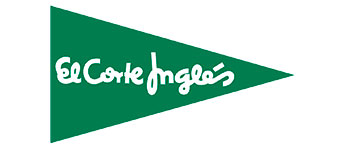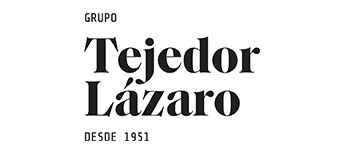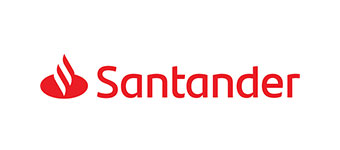Specialist Diploma in Economic Information
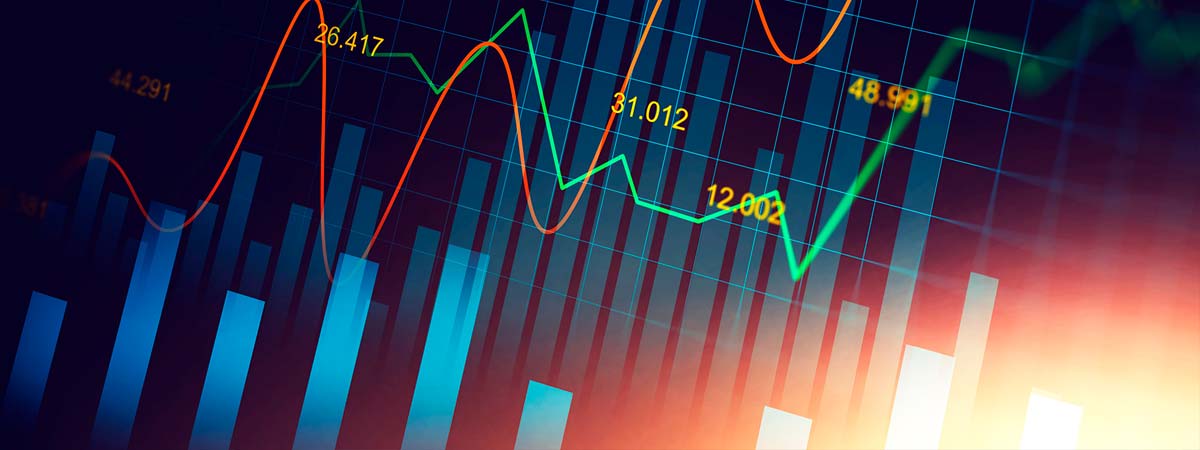
Unique program that is compatible with professional work and ideal for acquiring competences in economic journalism
Given today's complexity of economic information, the Specialist Diploma in Economic Information offers university graduates the training that qualifies them as an expert, providing them with the specific competences to analyze and comment on documents and reports with economic content, while familiarizing them with the relevant sources and statistics, through the use of new technologies applied to the field of economic information, series of indicators and reference works.
Currently, economic information is not only gaining in importance but also in complexity; its social significance is broadened, as is the educational demands that its adequate treatment requires. Social interest and academic reasons, in short, are intertwined when evaluating economic information. This course is intended for students with a university degree and, preferably, graduates in Information Sciences who already have professional experience.
Curriculum
With a total workload of 30 ECTS credits, and divided into 9 compulsory subjects and a Specialist Final Project, the program of the Specialist Diploma in Economic Information consists of a face-to-face part and a remote part. The face-to-face part takes place over 16 days, each structured in a theory lecture —five hours in duration— taught by renowned full professors and teachers, and an applied session —of an hour and a half duration— by relevant professionals in the field of economic information.
The remote teaching program complements and expands on the syllabus of the face-to-face sessions, and includes the completion of work for the subjects that are covered, with the aid of the tutors' supervision.
Class attendance
subjects 14 ECTS
- 4 ECTS | Resource allocation, market and economic development (Mandatory)
- 4 ECTS | The Spanish economy in the European Union market (Mandatory)
- 4 ECTS | The Company and its accounting analysis (Mandatory)
- 2 ECTS | Economic information (Mandatory)
Distance learning
subject 16 ECTS
- 2 ECTS | Economic activity
- 2 ECTS | Public sector and foreign sector
- 2 ECTS | Economic policy
- 2 ECTS | Factor Market
- 2 ECTS | Companies and productive sectors
- 6 ECTS | Specialist final project (Project)
Professores
 José Luis García Delgado
Director académico. Profesor
Academic director. Professor
Catedrático de Economía Aplicada de la Universidad Nebrija y Titular de la Cátedra Fundación ”la Caixa” Economía y Sociedad. Es Académico de número de la Real Academia de Ciencias Morales y Políticas. Doctor Honoris Causa por las Universidades de Oviedo, Alicante, Zaragoza y Murcia y Lima. Es autor de un buen número de obras sobre procesos de modernización económica en Europa y España, y fundador-director de las revistas especializadas Investigaciones Económicas y Revista de Economía Aplicada. En 2014 se le concedió el Premio Nacional de Investigación en el área de Derecho y Ciencias Económicas y Sociales y la Medalla de Honor de la Universidad Complutense, y en 2016 el Premio de Economía Rey Juan Carlos.
José Luis García Delgado
Director académico. Profesor
Academic director. Professor
Catedrático de Economía Aplicada de la Universidad Nebrija y Titular de la Cátedra Fundación ”la Caixa” Economía y Sociedad. Es Académico de número de la Real Academia de Ciencias Morales y Políticas. Doctor Honoris Causa por las Universidades de Oviedo, Alicante, Zaragoza y Murcia y Lima. Es autor de un buen número de obras sobre procesos de modernización económica en Europa y España, y fundador-director de las revistas especializadas Investigaciones Económicas y Revista de Economía Aplicada. En 2014 se le concedió el Premio Nacional de Investigación en el área de Derecho y Ciencias Económicas y Sociales y la Medalla de Honor de la Universidad Complutense, y en 2016 el Premio de Economía Rey Juan Carlos.
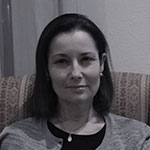 Marcela Sabaté Sort
Directora académica. Profesora
Academic director. Professor
Catedrática de Economía Aplicada en la Universidad de Zaragoza, especialista en el sector exterior de la economía española contemporánea, ha publicado numerosos artículos, individuales y en colaboración, sobre comercio y política arancelaria en Economic Letters, Revista de Historia Económica, Revista de Historia Industrial y Journal of International Trade and Ecomomic Development; sobre política cambiaria en Revista de Economía Aplicada, Journal of International Money and Finance, Journal of Policy Modelling y Open Economies Review, y sobre la cuestión monetaria en European Review of Economic History, Explorations in Economic History, Hacienda Pública Española, Financial History Review, Journal of International Financial Markets, Institutions and Money and Public Choice. Su libro más citado es El proteccionismo legitimado. Política arancelaria a principios de siglo (1996).
Marcela Sabaté Sort
Directora académica. Profesora
Academic director. Professor
Catedrática de Economía Aplicada en la Universidad de Zaragoza, especialista en el sector exterior de la economía española contemporánea, ha publicado numerosos artículos, individuales y en colaboración, sobre comercio y política arancelaria en Economic Letters, Revista de Historia Económica, Revista de Historia Industrial y Journal of International Trade and Ecomomic Development; sobre política cambiaria en Revista de Economía Aplicada, Journal of International Money and Finance, Journal of Policy Modelling y Open Economies Review, y sobre la cuestión monetaria en European Review of Economic History, Explorations in Economic History, Hacienda Pública Española, Financial History Review, Journal of International Financial Markets, Institutions and Money and Public Choice. Su libro más citado es El proteccionismo legitimado. Política arancelaria a principios de siglo (1996).
 Miguel Ángel Noceda Llano
Director de las sesiones aplicadas. Profesor
Director of applied sessions. Professor
Licenciado en Ciencias de la Información por la Universidad Complutense de Madrid,
comenzó a trabajar en la revista Mercado, uno de los principales viveros de periodistas
económicos, y en Rapport Económico. Trabajó en el diario Cinco Días y formó parte del
equipo fundador de La Gaceta de los Negocios. En octubre de 1989 entró en El País,
donde ha hecho información sobre energía, banca y empresas y empresarios, siendo
durante 12 años redactor jefe de la sección de Economía y después corresponsal de
la misma.
Ha sido presidente de la Asociación de Periodistas de Información Económica
(APIE) y, en la actualidad, es presidente de la Federación de Asociaciones de
Periodistas de España (FAPE) y vicepresidente tercero de la Asociación de la Prensa
de Madrid (APM).
Desde 1999 dirige el curso de Economía organizado por la APIE en la Universidad
Internacional Menéndez Pelayo (UIMP) de Santander, y desde 2003 es codirector del
Diploma de Especialización en Información Económica.
Ha escrito Radiografía del empresariado español (Catarata) y La economía de la democracia
(Espasa), junto a Carlos Solchaga, Pedro Solbes y Luis de Guindos.
Miguel Ángel Noceda Llano
Director de las sesiones aplicadas. Profesor
Director of applied sessions. Professor
Licenciado en Ciencias de la Información por la Universidad Complutense de Madrid,
comenzó a trabajar en la revista Mercado, uno de los principales viveros de periodistas
económicos, y en Rapport Económico. Trabajó en el diario Cinco Días y formó parte del
equipo fundador de La Gaceta de los Negocios. En octubre de 1989 entró en El País,
donde ha hecho información sobre energía, banca y empresas y empresarios, siendo
durante 12 años redactor jefe de la sección de Economía y después corresponsal de
la misma.
Ha sido presidente de la Asociación de Periodistas de Información Económica
(APIE) y, en la actualidad, es presidente de la Federación de Asociaciones de
Periodistas de España (FAPE) y vicepresidente tercero de la Asociación de la Prensa
de Madrid (APM).
Desde 1999 dirige el curso de Economía organizado por la APIE en la Universidad
Internacional Menéndez Pelayo (UIMP) de Santander, y desde 2003 es codirector del
Diploma de Especialización en Información Económica.
Ha escrito Radiografía del empresariado español (Catarata) y La economía de la democracia
(Espasa), junto a Carlos Solchaga, Pedro Solbes y Luis de Guindos.
 Nieves Amigo Benito
Profesora
Professor
Doctora en Periodismo por la Universidad Complutense de Madrid, con más de 25 años de experiencia en periodismo financiero y bursátil. Ha desarrollado la mayor parte de su carrera profesional en la web Bolsamanía, donde ocupa el cargo de Deputy Editor, y a lo largo de los años ha colaborado con múltiples medios, como ABC, El Mundo, Cadena Cope, La Voz de Galicia, Diario de Burgos y Diario de León. Es profesora del Máster en Periodismo Económico de la Universidad Rey Juan Carlos, e imparte cursos especializados en periodismo económico en colaboración con la Asociación de la Prensa de Madrid.
Nieves Amigo Benito
Profesora
Professor
Doctora en Periodismo por la Universidad Complutense de Madrid, con más de 25 años de experiencia en periodismo financiero y bursátil. Ha desarrollado la mayor parte de su carrera profesional en la web Bolsamanía, donde ocupa el cargo de Deputy Editor, y a lo largo de los años ha colaborado con múltiples medios, como ABC, El Mundo, Cadena Cope, La Voz de Galicia, Diario de Burgos y Diario de León. Es profesora del Máster en Periodismo Económico de la Universidad Rey Juan Carlos, e imparte cursos especializados en periodismo económico en colaboración con la Asociación de la Prensa de Madrid. Ha disfrutado de varias becas durante su formación académica, entre las que destaca la beca de postgrado de la Fundación Botín, concedida por mérito académico y, más recientemente, recibió una de las Becas Media Excellence 2024 de IESE Business School para cursar un Programa Business Specialist. La IA generativa y su aplicación en las redacciones centra sus intereses formativos más recientes.
Forma parte de la Asociación de Periodistas de Información Económica (APIE).
 Sara Barcenilla Visús
Profesora
Professor
Profesora Titular de Economía Aplicada en la Facultad de Ciencias Económicas y Empresariales de la Universidad de Zaragoza. Su investigación abarca el estudio de los factores explicativos del crecimiento económico con especial énfasis en el comercio internacional, con especial énfasis en el progreso técnico y la tecnología. Sus más recientes trabajos han sido publicados en Structural Change and Economic Dynamics, Internacional Review of Applied Economics, Revista de Economía Aplicada, The Economic Record, Journal of Applied Economics, Panoeconomicus y Empirica.
Sara Barcenilla Visús
Profesora
Professor
Profesora Titular de Economía Aplicada en la Facultad de Ciencias Económicas y Empresariales de la Universidad de Zaragoza. Su investigación abarca el estudio de los factores explicativos del crecimiento económico con especial énfasis en el comercio internacional, con especial énfasis en el progreso técnico y la tecnología. Sus más recientes trabajos han sido publicados en Structural Change and Economic Dynamics, Internacional Review of Applied Economics, Revista de Economía Aplicada, The Economic Record, Journal of Applied Economics, Panoeconomicus y Empirica.
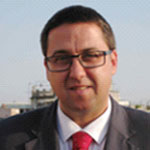 Joan Batalla Bejerano
Profesor
Professor
Licenciado en Economía por la Universidad de Barcelona, Doctor en Economía -Premio Extraordinario de doctorado por la Universitat Rovira i Virgili, completó su formación con el Programa de Dirección General (PGD) del IESE. Es Director General de la Fundación para la Sostenibilidad Energética y Ambiental (FUNSEAM), actividad que compagina con la investigación en el marco de la Cátedra de Sostenibilidad Energética y con la docencia como profesor de la Universidad de Barcelona. Es Presidente de la Asociación Española del Gas (SEDIGAS).
Joan Batalla Bejerano
Profesor
Professor
Licenciado en Economía por la Universidad de Barcelona, Doctor en Economía -Premio Extraordinario de doctorado por la Universitat Rovira i Virgili, completó su formación con el Programa de Dirección General (PGD) del IESE. Es Director General de la Fundación para la Sostenibilidad Energética y Ambiental (FUNSEAM), actividad que compagina con la investigación en el marco de la Cátedra de Sostenibilidad Energética y con la docencia como profesor de la Universidad de Barcelona. Es Presidente de la Asociación Española del Gas (SEDIGAS). Con más de 20 años de experiencia en el ámbito de la economía, la industria y la energía, especialmente en el ámbito de la regulación energética, entre los años 2005 y 2013 desarrolló su carrera profesional en la Comisión Nacional de Energía (CNE), siendo desde 2011 miembro de su Consejo de Administración.
 Zulima Fernández Rodríguez
Profesora
Professor
Catedrática de Organización de Empresas de la Universidad Carlos III de Madrid desde 1992 y,
con anterioridad, de la Universidad de Salamanca (1990-1992). También es Directora del Instituto
Conde de Campomanes de Iniciativas empresariales y empresa familiar y de la Cátedra de
Iniciativas empresariales y empresa familiar de la Universidad Carlos III de Madrid.
Con anterioridad, y entre otros cargos, ha sido Directora de la Agencia Nacional de Evaluación
de la Calidad y Acreditación (ANECA), Vicerrectora de Ordenación Académica y Convergencia
Europea de la Universidad Carlos III de Madrid y Presidente de la Asociación Científica de
Economía y Dirección de la Empresa (ACEDE).
Sus principales líneas de investigación son digitalización, empresa familiar, internacionalización,
innovación y competitividad, temas sobre los que ha publicado en revistas académicas
internacionales de primer nivel, como Journal of International Business Studies, Journal of World Business,
Family Business Review, Strategic Organization, Technovation, Telecommunications Policy y Journal of Business
Research, entre otras. Igualmente, es autora de diversos capítulos en libros especializados. Su
investigación ha sido financiada en programas competitivos, y ha dirigido doce de ellos, siete
nacionales y cinco regionales.
Zulima Fernández Rodríguez
Profesora
Professor
Catedrática de Organización de Empresas de la Universidad Carlos III de Madrid desde 1992 y,
con anterioridad, de la Universidad de Salamanca (1990-1992). También es Directora del Instituto
Conde de Campomanes de Iniciativas empresariales y empresa familiar y de la Cátedra de
Iniciativas empresariales y empresa familiar de la Universidad Carlos III de Madrid.
Con anterioridad, y entre otros cargos, ha sido Directora de la Agencia Nacional de Evaluación
de la Calidad y Acreditación (ANECA), Vicerrectora de Ordenación Académica y Convergencia
Europea de la Universidad Carlos III de Madrid y Presidente de la Asociación Científica de
Economía y Dirección de la Empresa (ACEDE).
Sus principales líneas de investigación son digitalización, empresa familiar, internacionalización,
innovación y competitividad, temas sobre los que ha publicado en revistas académicas
internacionales de primer nivel, como Journal of International Business Studies, Journal of World Business,
Family Business Review, Strategic Organization, Technovation, Telecommunications Policy y Journal of Business
Research, entre otras. Igualmente, es autora de diversos capítulos en libros especializados. Su
investigación ha sido financiada en programas competitivos, y ha dirigido doce de ellos, siete
nacionales y cinco regionales.
 David Fernández Díaz
Profesor
Professor
Licenciado en Ciencias de la Información por la Universidad Complutense de Madrid y Máster de Periodismo El País-UAM, cursó un Postgrado de periodismo económico en la Universidad de Columbia (EE. UU.). Redactor desde 2005 de El País, donde es responsable del suplemento económico Negocios, con anterioridad lo fue de Cinco Días.
David Fernández Díaz
Profesor
Professor
Licenciado en Ciencias de la Información por la Universidad Complutense de Madrid y Máster de Periodismo El País-UAM, cursó un Postgrado de periodismo económico en la Universidad de Columbia (EE. UU.). Redactor desde 2005 de El País, donde es responsable del suplemento económico Negocios, con anterioridad lo fue de Cinco Días. Le han sido concedidos los Premios de periodismo económico que otorgan CNMV, Citigroup, AECOC y APD.
 Rosario Gandoy Juste
Profesora
Professor
Catedrática de Economía Aplicada en la Universidad de Castilla La Mancha. Ha sido miembro del Consejo Asesor de la Ciencia, Tecnología e Innovación en Castilla La Mancha (2021-2023), y vocal del Consejo Regional de la Competencia en Castilla La Mancha (2008-2011). Es Decana Honoraria de la Facultad de Ciencias Jurídicas y Sociales de Toledo y Presidenta de la Sección de Economía y Empresa de la Academia de Ciencias Sociales y Humanidades de Castilla la Mancha. En 2021 recibió el Premio a la Investigación e Innovación de Castilla la Mancha en Ciencias Sociales y Jurídicas.
Sus investigaciones más recientes versan sobre cadenas globales de valor y
estructura productiva. Los resultados de su investigación
han dado lugar a diversas publicaciones en revistas especializadas como Review of World
Economy, The World Economy, Applied Economics, Economic Modelling, Revista de Economía
Aplicada, Papeles de Economía Española e Información Comercial Española.
Rosario Gandoy Juste
Profesora
Professor
Catedrática de Economía Aplicada en la Universidad de Castilla La Mancha. Ha sido miembro del Consejo Asesor de la Ciencia, Tecnología e Innovación en Castilla La Mancha (2021-2023), y vocal del Consejo Regional de la Competencia en Castilla La Mancha (2008-2011). Es Decana Honoraria de la Facultad de Ciencias Jurídicas y Sociales de Toledo y Presidenta de la Sección de Economía y Empresa de la Academia de Ciencias Sociales y Humanidades de Castilla la Mancha. En 2021 recibió el Premio a la Investigación e Innovación de Castilla la Mancha en Ciencias Sociales y Jurídicas.
Sus investigaciones más recientes versan sobre cadenas globales de valor y
estructura productiva. Los resultados de su investigación
han dado lugar a diversas publicaciones en revistas especializadas como Review of World
Economy, The World Economy, Applied Economics, Economic Modelling, Revista de Economía
Aplicada, Papeles de Economía Española e Información Comercial Española.
 Jesús García López
Profesor
Professor
Periodista financiero y consultor, actualmente es socio director de la agencia de comunicación www.cricricom.com, fundada en 2018, especializada en crisis y apoyo a consejeros y empresas familiares.
Jesús García López
Profesor
Professor
Periodista financiero y consultor, actualmente es socio director de la agencia de comunicación www.cricricom.com, fundada en 2018, especializada en crisis y apoyo a consejeros y empresas familiares. Diez años -de 2007 a 2017- como DIRCOM CORP de Iberdrola, una de las mayores utilities del mundo por capitalización y líder en energía renovable, cerraron una etapa como periodista iniciada en 1987.
Con más de 1.000 conexiones en directo para Tele5 y diez años de crónicas diarias como corresponsal bursátil en Onda Cero, Jesús García ha cubierto para medios digitales (el confidencial) periódicos (EL SOL y ABC) y agencias (EFE), los acontecimientos económicos que van desde el colapso del SME hasta la quiebra de Lehman Brothers, que marcó el inicio de la crisis financiera más grave desde la Gran Depresión.
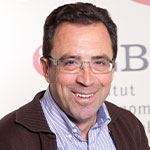 Antoni Garrido Torres
Profesor
Professor
Catedrático de Economía Aplicada en la Facultad de Economía y Empresa de la Universidad de Barcelona e investigador del Instituto de Economía de Barcelona (IEB). Especializado en el campo de la Economía Financiera, ha publicado numerosos trabajos y artículos sobre esta materia en revistas especializadas de ámbito tanto nacional como internacional, siendo merecedor de los premios “Antoni Puges” (1983) y Joan Sardà Dexeus (2009). Miembro de la Asociación Europa de profesores de Banca y Finanzas, ha sido también miembro del Consejo Asesor del Instituto Catalán de Finanzas (ICF) y secretario del Consejo de Redacción de la Revista Econòmica de Catalunya.
Antoni Garrido Torres
Profesor
Professor
Catedrático de Economía Aplicada en la Facultad de Economía y Empresa de la Universidad de Barcelona e investigador del Instituto de Economía de Barcelona (IEB). Especializado en el campo de la Economía Financiera, ha publicado numerosos trabajos y artículos sobre esta materia en revistas especializadas de ámbito tanto nacional como internacional, siendo merecedor de los premios “Antoni Puges” (1983) y Joan Sardà Dexeus (2009). Miembro de la Asociación Europa de profesores de Banca y Finanzas, ha sido también miembro del Consejo Asesor del Instituto Catalán de Finanzas (ICF) y secretario del Consejo de Redacción de la Revista Econòmica de Catalunya.
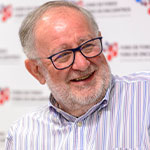 Fernando González Urbaneja
Profesor
Professor
Es Licenciado en Ciencias Políticas por la Complutense y en Periodismo por la Escuela de Periodismo de Madrid. Es director del mensual Consejeros y de la web http://www.thecorner.eu/. Interviene en La SEXTA, Al Rojo Vivo, como comentarista de temas económicos. Presidente desde 2023 de la Comisión de Arbitraje, Quejas y Deontología del periodismo de la Federación de Asociaciones de Periodistas de España (FAPE). Fue Presidente de la Asociación de la Prensa de Madrid (APM) y de la FAPE.
Fernando González Urbaneja
Profesor
Professor
Es Licenciado en Ciencias Políticas por la Complutense y en Periodismo por la Escuela de Periodismo de Madrid. Es director del mensual Consejeros y de la web http://www.thecorner.eu/. Interviene en La SEXTA, Al Rojo Vivo, como comentarista de temas económicos. Presidente desde 2023 de la Comisión de Arbitraje, Quejas y Deontología del periodismo de la Federación de Asociaciones de Periodistas de España (FAPE). Fue Presidente de la Asociación de la Prensa de Madrid (APM) y de la FAPE. Ha sido colaborador del diario Madrid, redactor de la agencia Logos, fundador y redactor del semanario económico Doblón, fundador y redactor jefe de la sección Economía de El País, Director de Cambio 16, Director de Noticias en A3 TV y Director de Cinco Días. Entre 1999 y 2012 ha sido profesor de economía y de periodismo en las universidades Carlos III y Nebrija.
 Antonio Gonzalo Angulo
Profesor
Professor
Licenciado y Doctor en Ciencias Económicas y Empresariales por la Universidad Autónoma de Madrid. Catedrático Emérito de Economía Financiera y Contabilidad de la Universidad de Alcalá. Ha sido Catedrático de las Universidades de Zaragoza y Autónoma de Madrid. Es auditor de cuentas, miembro del Registro Oficial de Auditores de Cuentas y del Instituto de Censores Jurados de Cuentas de España, así como Experto Contable de la Asociación Española de Contabilidad y Administración de Empresas (AECA), donde es miembro de la Comisión de Principios Contables. Ha sido profesor visitante, impartiendo clase e investigando, en universidades de Estados Unidos, Rumanía, Argentina, Chile, Francia y China. Ha sido presidente del Instituto de Contabilidad y Auditoría de Cuentas del Ministerio de Economía en el periodo 2009-12. También ha pertenecido al Banking Stakeholder Group de la Autoridad Bancaria Europea, en el periodo 2014-17.
Antonio Gonzalo Angulo
Profesor
Professor
Licenciado y Doctor en Ciencias Económicas y Empresariales por la Universidad Autónoma de Madrid. Catedrático Emérito de Economía Financiera y Contabilidad de la Universidad de Alcalá. Ha sido Catedrático de las Universidades de Zaragoza y Autónoma de Madrid. Es auditor de cuentas, miembro del Registro Oficial de Auditores de Cuentas y del Instituto de Censores Jurados de Cuentas de España, así como Experto Contable de la Asociación Española de Contabilidad y Administración de Empresas (AECA), donde es miembro de la Comisión de Principios Contables. Ha sido profesor visitante, impartiendo clase e investigando, en universidades de Estados Unidos, Rumanía, Argentina, Chile, Francia y China. Ha sido presidente del Instituto de Contabilidad y Auditoría de Cuentas del Ministerio de Economía en el periodo 2009-12. También ha pertenecido al Banking Stakeholder Group de la Autoridad Bancaria Europea, en el periodo 2014-17.
Sus áreas de especialidad en la investigación son la contabilidad internacional (entre otras obras, ha traducido las Normas Internacionales de Información Financiera), la auditoría de cuentas y el análisis y consolidación de estados financieros.
En la Universidad de Alcalá ha sido Vicerrector de Asuntos Económicos (1986- 2001), Defensor Universitario (2014-17), Decano de la Facultad de Ciencias Económicas, Empresariales y Turismo (2012-13) y Director del Departamento de Economía y Dirección de Empresas (2016-2022). Por su labor, ha recibido la medalla de plata de esta Universidad.
 Ana Belén Gracia Andía
Profesora
Professor
Profesora Titular del Departamento de Economía Aplicada de la Universidad de Zaragoza. Investigadora del Grupo de Investigación de Excelencia Sector Exterior e Integración Monetaria (SEIM). Ha trabajado fundamentalmente en temas relacionados con el sector exterior de la economía española y sus políticas comercial y cambiaria.
Ana Belén Gracia Andía
Profesora
Professor
Profesora Titular del Departamento de Economía Aplicada de la Universidad de Zaragoza. Investigadora del Grupo de Investigación de Excelencia Sector Exterior e Integración Monetaria (SEIM). Ha trabajado fundamentalmente en temas relacionados con el sector exterior de la economía española y sus políticas comercial y cambiaria.Ha formado parte de muchos proyectos de investigación, publicado numerosos artículos en revistas JCR e indexadas y participado en varias obras colectivas como Lecciones de Economía española, España. Siglo XXI o Del Real al euro. Una historia de la peseta. Ha sido Secretaria del Consejo Editorial de Revista de Economía Aplicada durante más de doce años.
 Miguel Jiménez Cabeza
Profesor
Professor
Licenciado en Derecho y Ciencias Económicas y Empresariales por la Universidad Pontificia de Comillas (ICADE) y en Ciencias Políticas por la UNED, cursó el Máster en Periodismo UAM-El País, un programa de Desarrollo de Directivos en el IESE y un curso de transformación digital de ESADE y la Singularity University en Silicon Valley.
Miguel Jiménez Cabeza
Profesor
Professor
Licenciado en Derecho y Ciencias Económicas y Empresariales por la Universidad Pontificia de Comillas (ICADE) y en Ciencias Políticas por la UNED, cursó el Máster en Periodismo UAM-El País, un programa de Desarrollo de Directivos en el IESE y un curso de transformación digital de ESADE y la Singularity University en Silicon Valley.
En 1996 se incorporó a Cinco Días, donde fue jefe de la sección de Mercados, redactor jefe de Empresas y subdirector, hasta incorporarse a El País en 2006 como redactor jefe de Economía y Negocios. En 2015 fue nombrado subdirector de Información de El País; en 2018, Director de Cinco Días, y en 2020, Director adjunto de El País, cargo que ejerce en la actualidad, tras su desempeño como Corresponsal jefe de EL PAÍS en Estados Unidos durante un periodo de tres años.
 Juan Carlos Jiménez Jiménez
Profesor
Professor
Profesor titular de Economía Aplicada en la Universidad de Alcalá. En esta ha sido Director de Departamento, y en la Universidad Internacional Menéndez Pelayo ha ocupado los cargos de Secretario General y Vicerrector de Ordenación Académica. Ha sido Subdirector de Estudios de la Comisión Nacional de Energía y Secretario Ejecutivo de la Asociación Iberoamericana de Entidades Reguladoras de la Energía.
Juan Carlos Jiménez Jiménez
Profesor
Professor
Profesor titular de Economía Aplicada en la Universidad de Alcalá. En esta ha sido Director de Departamento, y en la Universidad Internacional Menéndez Pelayo ha ocupado los cargos de Secretario General y Vicerrector de Ordenación Académica. Ha sido Subdirector de Estudios de la Comisión Nacional de Energía y Secretario Ejecutivo de la Asociación Iberoamericana de Entidades Reguladoras de la Energía. Es autor de numerosos estudios sobre el proceso de industrialización en la España contemporánea y el sector energético. Ha codirigido el proyecto de Fundación Telefónica sobre “Valor económico del español”, con 14 volúmenes publicados por la editorial Ariel; coautor, entre ellos, de Economía del español. Una introducción, El español en los flujos económicos internacionales, Valor económico del español y Lengua, empresa y mercado. Coautor, con J. A. Alonso y J. L. García Delgado, de Los futuros del español (Alianza, 2023).
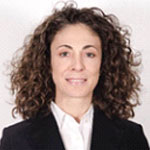 María Ángeles Montoro Sánchez
Profesora
Professor
Catedrática de la Universidad Complutense de Madrid (UCM) en el Departamento de Organización de Empresas y Marketing. Investigadora Adscrita del Instituto Complutense de Estudios Internacionales, su actividad investigadora abarca áreas como el crecimiento empresarial, gobierno corporativo, emprendimiento e innovación, internacionalización, alianzas y redes de empresas, y localización en parques científicos, incubadoras, etc. Dirige el Grupo de Investigación UCM Estrategias de Crecimiento Empresarial y tiene artículos publicados en revistas nacionales e internacionales de reconocido prestigio. Ha coordinado Programas de Doctorado en Dirección de Empresas y Administración de Empresas en la UCM durante más de 15 años. Entre sus libros, destacan Fundamentos de Administración de Empresas e Introduction to Business Administration.
María Ángeles Montoro Sánchez
Profesora
Professor
Catedrática de la Universidad Complutense de Madrid (UCM) en el Departamento de Organización de Empresas y Marketing. Investigadora Adscrita del Instituto Complutense de Estudios Internacionales, su actividad investigadora abarca áreas como el crecimiento empresarial, gobierno corporativo, emprendimiento e innovación, internacionalización, alianzas y redes de empresas, y localización en parques científicos, incubadoras, etc. Dirige el Grupo de Investigación UCM Estrategias de Crecimiento Empresarial y tiene artículos publicados en revistas nacionales e internacionales de reconocido prestigio. Ha coordinado Programas de Doctorado en Dirección de Empresas y Administración de Empresas en la UCM durante más de 15 años. Entre sus libros, destacan Fundamentos de Administración de Empresas e Introduction to Business Administration.
 Rafael Myro Sánchez
Profesor
Professor
Catedrático de Economía Aplicada de la Universidad Complutense de Madrid. Es autor de numerosos trabajos sobre la economía española, especialmente referidos a su crecimiento, la especialización y competitividad de la industria, el comercio exterior y el papel de la inversión extranjera, que han sido publicados en diversos libros y en artículos recogidos en las principales revistas económicas españolas y de otros países. Ha sido miembro del Consejo Académico del Real Colegio Complutense en la Universidad de Harvard, y Director del Departamento de Economía Aplicada II de la UCM.
Rafael Myro Sánchez
Profesor
Professor
Catedrático de Economía Aplicada de la Universidad Complutense de Madrid. Es autor de numerosos trabajos sobre la economía española, especialmente referidos a su crecimiento, la especialización y competitividad de la industria, el comercio exterior y el papel de la inversión extranjera, que han sido publicados en diversos libros y en artículos recogidos en las principales revistas económicas españolas y de otros países. Ha sido miembro del Consejo Académico del Real Colegio Complutense en la Universidad de Harvard, y Director del Departamento de Economía Aplicada II de la UCM. Aparte de su trabajo como investigador y docente, el profesor Rafael Myro ha colaborado con el Gobierno de España y varios Gobiernos regionales en el análisis de la industria, su competitividad exterior y las líneas de orientación de la política industrial.
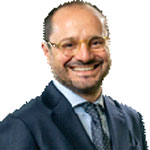 Rafael Núñez-Lagos De Miguel
Profesor
Professor
Es socio de Uría Menéndez, firma a la que se incorporó en 2001. Cuenta con amplia experiencia asesorando en operaciones de M&A y en materia de derecho de sociedades y gobierno corporativo. Su práctica abarca otros sectores del derecho mercantil y del derecho privado en general.
Rafael Núñez-Lagos De Miguel
Profesor
Professor
Es socio de Uría Menéndez, firma a la que se incorporó en 2001. Cuenta con amplia experiencia asesorando en operaciones de M&A y en materia de derecho de sociedades y gobierno corporativo. Su práctica abarca otros sectores del derecho mercantil y del derecho privado en general.Ha intervenido en operaciones de compraventa, concentración y reestructuración de todo tipo de compañías, con especial foco en el sector financiero y en el de las infraestructuras. Ha asesorado a entidades de crédito, empresas de servicios de inversión y compañías aseguradoras en asuntos tanto corporativos como regulatorios. Asesora recurrentemente en cuestiones de gobierno corporativo y en conflictos societarios.
Imparte clases, publica y pronuncia conferencias sobre las materias propias de su especialidad. En el curso 2023-24 impartió clases, entre otros, en el Máster de Asesoría Jurídica de Empresa, el Máster de Acceso a la Abogacía y el Máster de Abogacía Internacional, todos ellos de la Universidad Carlos III de Madrid.
 Rafael Rubio Gómez-Caminero
Profesor
Professor
Rafael Rubio dirigió durante 22 años el semanario Inversión, que llegó a convertirse en
el semanario económico de mayor venta en España. Creador de BOLSALIA y
BORSADINER, las ferias de la Bolsa que durante una década se celebraron en España,
fue Director de la Gaceta de los Negocios y subdirector de Diario 16. Actualmente, dirige la revista trimestral “Asesores Financieros EFPA”.
Rafael Rubio Gómez-Caminero
Profesor
Professor
Rafael Rubio dirigió durante 22 años el semanario Inversión, que llegó a convertirse en
el semanario económico de mayor venta en España. Creador de BOLSALIA y
BORSADINER, las ferias de la Bolsa que durante una década se celebraron en España,
fue Director de la Gaceta de los Negocios y subdirector de Diario 16. Actualmente, dirige la revista trimestral “Asesores Financieros EFPA”.Es autor de Manos arriba, esto es un banco y, más recientemente, de El astuto ahorrador, donde desarrolla toda su experiencia como profesional del mundo de la información financiera y como ahorrador e inversor. Ha sido Presidente de la Asociación de Periodistas de Información Económica (APIE), y promotor durante su mandato de la elaboración y aprobación del Código ético y de conducta para los miembros de la APIE, primer código de estas características aprobado en España por una asociación de periodistas. Ha sido también vocal y responsable de asuntos económicos en la Asociación de Periodistas de Madrid (APM). Galardonado en dos ocasiones por la Cámara de Comercio de Madrid por "la mejor labor informativa del año" por su trabajo realizado en Diario 16 y La Gaceta de los Negocios. Fue ganador del Premio Schroders al mejor artículo de información económica en el año 2002, y en el 2008 le fue otorgado el Premio al Mejor Profesional de Información Económica.
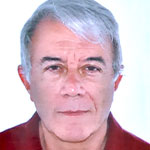 Carlos Salas Abad
Profesor
Professor
Licenciado en Periodismo y Filosofía, y Doctor en Filosofía. Ha sido director de Capital, El Economista, Metro y lainformacion.com, y trabajado diez años en El Mundo como redactor jefe.
Carlos Salas Abad
Profesor
Professor
Licenciado en Periodismo y Filosofía, y Doctor en Filosofía. Ha sido director de Capital, El Economista, Metro y lainformacion.com, y trabajado diez años en El Mundo como redactor jefe.
Es profesor de Comunicación en el IESE, EAE Business School, La Salle y otras escuelas de negocios. Es profesor de Periodismo en la Escuela de El Mundo y en la Universidad Complutense.
Ha impartido cursos de comunicación escrita y hablada en Accenture, KPMG, BBVA, Grupo Santander, Repsol, IESE, Indra, Gas Natural, Allianz, Google, Greenpeace, Guardia Civil, Telefónica, McKinsey, CNMV, Mapfre y Universidad Europea de Madrid.
Fue bloguero de Yahoo! y Estrella Digital, y columnista de Reader's Digest. Ha publicado nueve libros: siete de ellos de comunicación. Los más conocidos son: Storytelling, la escritura mágica; Trucos para Escribir Mejor; y Cómo Hablar y Presentar en Público.
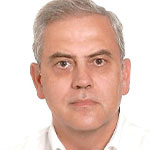 Jaime Jesús Sanaú Villarroya
Profesor
Professor
Licenciado en Ciencias Económicas y Empresariales-Sección de Empresariales (Premio Extraordinario de Licenciatura) y Doctor en Ciencias Económicas y Empresariales-Sección de Económicas.
Jaime Jesús Sanaú Villarroya
Profesor
Professor
Licenciado en Ciencias Económicas y Empresariales-Sección de Empresariales (Premio Extraordinario de Licenciatura) y Doctor en Ciencias Económicas y Empresariales-Sección de Económicas.Es Profesor Titular del Departamento de Economía Aplicada de la Universidad de Zaragoza, investigador colaborador del Grupo de Investigación Sector Exterior e Integración Monetaria (SEIM), del proyecto Vulnerabilidad patrimonial y personal: retos jurídicos y miembro investigador del Instituto Universitario de Investigación en Empleo, Sociedad Digital y Sostenibilidad (IEDIS).
Autor de numerosos trabajos publicados en revistas tanto nacionales como internacionales.Ssus investigaciones se centran en los factores que hacen prosperar a las economías con objeto de identificar soluciones prácticas que permitan a los responsables políticos aprovechar los elementos catalizadores del crecimiento económico sostenible (https://jaimesanau.framer.website/research).
 Carlos Sánchez Sanz
Profesor
Professor
Licenciado en Ciencias Económicas de la Información por la Universidad Complutense de Madrid, especialista en macroeconomía, economía internacional y política laboral y fiscal, desde 2005 es Director adjunto y miembro del Consejo Editorial de EL CONFIDENCIAL.
Carlos Sánchez Sanz
Profesor
Professor
Licenciado en Ciencias Económicas de la Información por la Universidad Complutense de Madrid, especialista en macroeconomía, economía internacional y política laboral y fiscal, desde 2005 es Director adjunto y miembro del Consejo Editorial de EL CONFIDENCIAL.
Con anterioridad ha sido Redactor Jefe de EXPANSIÓN, Director de Comunicación del CONSEJO ECONÓMICO Y SOCIAL DE ESPAÑA, y Redactor Jefe Nacional y Redactor Jefe Economía de EL MUNDO, de cuyo equipo fundador formó parte. Asimismo, realizó las funciones de Redactor Jefe Economía en TELEMADRID y es miembro de su equipo fundador.
Analista político y económico, en la actualidad, en CADENA SER (Hoy por Hoy) con Angels Barceló. Lo ha sido también en ONDA CERO, COPE y RADIO NACIONAL DE ESPAÑA.
Autor de los libros Dinero Fresco (2002), Los nuevos amos de España (2006) y, más recientemente, coautor responsable de la parte económica, de Estado de Alarma (2020).
En 2022 le fue otorgado el “Premio Rosa del Río Periodismo Económico” por la Asociación de Periodistas Europeos.
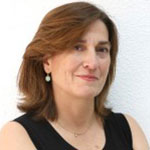 Rosa María Sánchez Sánchez
Profesora
Professor
Licenciada en Ciencias de la Información por la Universidad Complutense, posee un Máster Universitario de Investigación en Periodismo y ha trabajado como Redactora Jefe de Economía en El Periódico de Cataluña, en Madrid, hasta septiembre de 2025. Ha ejercido como colaboradora de Economía en el programa 24 Horas de RNE, en La Sexta, en TVE y en Cadena Cope.
Rosa María Sánchez Sánchez
Profesora
Professor
Licenciada en Ciencias de la Información por la Universidad Complutense, posee un Máster Universitario de Investigación en Periodismo y ha trabajado como Redactora Jefe de Economía en El Periódico de Cataluña, en Madrid, hasta septiembre de 2025. Ha ejercido como colaboradora de Economía en el programa 24 Horas de RNE, en La Sexta, en TVE y en Cadena Cope.
En 2020 fue distinguida con el premio Carlos Humanes de Periodismo Económico (actualmente, Premio Rosa del Río), en su tercera edición.
Ha sido miembro de la junta directiva de la Asociación de Periodistas de Información Económica (APIE) entre 2012 y 2019 y, en la actualidad, forma parte del consejo director de la Asociación de Periodistas Europeos (APE).
 Roberto Santos Alonso
Profesor
Professor
Licenciado en Ciencias de la Información, rama de Periodismo, y en Ciencias
Económicas, es socio fundador de Dédalo Comunicación, empresa en la que lleva más
de 30 años dedicada a la consultoría y diseño de estrategias de comunicación, tanto
para compañías nacionales como multinacionales. Responsable de proyectos
internacionales en Latinoamérica, ha trabajado en múltiples operaciones relevantes
de la historia reciente de la economía española y ha asesorado a grandes empresas
del IBEX, como Telefónica, Repsol o BBVA.
Su trayectoria periodística, siempre ligada al área de economía y laboral, se desarrolló
en los diarios Arriba, ABC y Diario 16. Asimismo, fue redactor jefe de la revista
Mercado y colaborador de numerosas publicaciones y revistas.
Miembro de la Asociación de Periodistas de Información Económica (APIE), es
autor del libro La conjura del zar, que aborda la transición político-económica y el
divorcio entre Felipe González y Nicolás Redondo.
Roberto Santos Alonso
Profesor
Professor
Licenciado en Ciencias de la Información, rama de Periodismo, y en Ciencias
Económicas, es socio fundador de Dédalo Comunicación, empresa en la que lleva más
de 30 años dedicada a la consultoría y diseño de estrategias de comunicación, tanto
para compañías nacionales como multinacionales. Responsable de proyectos
internacionales en Latinoamérica, ha trabajado en múltiples operaciones relevantes
de la historia reciente de la economía española y ha asesorado a grandes empresas
del IBEX, como Telefónica, Repsol o BBVA.
Su trayectoria periodística, siempre ligada al área de economía y laboral, se desarrolló
en los diarios Arriba, ABC y Diario 16. Asimismo, fue redactor jefe de la revista
Mercado y colaborador de numerosas publicaciones y revistas.
Miembro de la Asociación de Periodistas de Información Económica (APIE), es
autor del libro La conjura del zar, que aborda la transición político-económica y el
divorcio entre Felipe González y Nicolás Redondo.
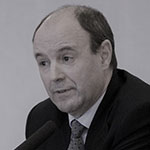 José María Serrano Sanz
Profesor
Professor
Doctor en Economía por la Universidad de Barcelona y Catedrático Emérito de la Universidad de Zaragoza. Es Académico de número de la Real Academia de Ciencias Morales y Políticas.
José María Serrano Sanz
Profesor
Professor
Doctor en Economía por la Universidad de Barcelona y Catedrático Emérito de la Universidad de Zaragoza. Es Académico de número de la Real Academia de Ciencias Morales y Políticas. Autor de más de tres centenares de publicaciones académicas, incluyendo una veintena de libros y numerosos artículos en revistas de investigación. Ha dirigido dieciséis Tesis Doctorales y más de cuarenta Proyectos de Investigación. Es vocal del Consejo Superior de Estadística de España y miembro de diversos consejos editoriales.
Employability
The program prepares to access the jobs that require specific training for the processing of economic information.
More Academic Info
Competences
Specific Competences:
- SC1.– Understand the macroeconomic variables that regulate the economy and their interrelation with the management of companies and public administrations.
- SC2.- Interpret the behavior of economic agents in light of the approaches of microeconomic theory.
- SC3.– Identify the determining factors of economic growth and analyze their amount in the Spanish economy.
- SC4.– Interpret the economic and equity situation of the company through accounting analysis.
- SC5.- Explain the productive structure in Spain and the importance of the sectors.
- SC6.– Understand the role and instruments of intervention of the public sector in the allocation of resources, the redistribution of income and economic stability.
- SC7.- Understand the role of the financial system, its institutional structure and its role in the current economic crisis.
- SC8.- Know the causes of the imbalance in the labor market, as well as the effects of labor reforms.
- SC9.- Interpret the imbalances and adjustments of the foreign sector and their effects on the economy.
- SC10.- Prepare argued information on specific situations of the economy (international, national or regional) or its sectors in the different written and audiovisual media.
- SC11.– Know and identify the sources of relevant economic information and make use of their content to analyze the economic reality.
Transversal Competences
- Generic instrumental competences:
- Ability for analysis and synthesis.
- Organizational and planning skills.
- Ability to analyze and search for information from various sources.
- Use the technological tools and instruments necessary in their professional performance.
- Communicate correctly in writing and orally, emphasizing argumentation.
- Communicate appropriately in the professional field, orally and in writing.
- Generic systemic competences:
- Motivation for quality and excellence.
- Adaptability to new situations.
- Autonomy for training and continuous learning.
- Specific applicability competences:
- Ability to apply knowledge in practice.
Objectives
Main objective:
The objective of this program is to offer university graduates the necessary education to acquire high competence in economic journalism.
Currently, the importance and complexity of economic information require greater educational and instrumental demands from the professionals who deal with it. Hence, in this program, in addition to the theoretical and conceptual basis, the sources of economic information -documentary, statistical, literary- and journalistic writing techniques are studied.
Specific objectives
The Specialist Diploma in Economic Information must get along equally well in the field of macroeconomic analysis as in that of the company analysis. Therefore, it begins with an introduction to the basic concepts of macro and microeconomics, as well as the main currents of economic thought, the program systematically addresses the situation and prospects for the Spanish economy within the framework of the European Union. For this, the sectoral (energy sector and financial sector…) and institutional (labor market, public sector, foreign sector…) areas of greatest importance and significance are selected.
In turn, as the company and the entire business fabric constitute the object of a fundamental part of professional economic information, almost a third of the program deals with the study of its main components, both from the perspective of economic theory and from the point of view of legal-commercial analysis and accounting and financial analysis, paying special attention to current trends (internationalization, mergers and acquisitions, new business models) and to the values and practices that legitimize the business function and the role of the entrepreneur in an open society.
Methodology
Teaching organization
Classroom attendance teaching:
16 days (Monday). Each day consists of a theoretical lecture, lasting five hours, given by prestigious professors and teachers of Economics and Law from seven Spanish universities, and an applied session, lasting an hour and a half, by relevant professionals in the field of the economic information represented by journalistic information companies.
January: 27.
February: 3 and 10, 17 and 24.
March: 3,10,17,24,31.
April: 7 and 28.
May: 5,12,19 and 26.
The schedule established for the Lectures, from 10:00 a.m. to 3:00 p.m. and from 15:30 to 18:30 p.m., may vary in the event that complementary activities are scheduled, such as conferences or visits to the entities that support the postgraduate degree.
Remote teaching:
Supervised by eight professors-tutors who provide the students with the didactic material corresponding to the syllabus of this section of the program, and send them the exercises that they must do and present for evaluation.
The student will carry out a Specialist Final Project, guided by a tutor, and will defend it before a tribunal made up of the directors of the Degree.
Examination sessions:
- June transcripts (1st examination session). July transcripts (2nd examination session)
- June Tribunal transcripts (1st examination session). July (2nd examination session)
Evaluation system:
- Standard grading (from 0 to 10) and Final Project defense before Tribunal.
Calendar
Face-to-face teaching
In-person sessions on Mondays.
will be taught on the Nebrija University Campus in Madrid-Princesa, with the following schedule*:
Calendar
Course schedule
- Morning hours: 9:30 a.m. to 2:30 p.m.
- Afternoon hours: 3:30 p.m. to 6:30 p.m.
* It may suffer some variation when complementary activities to academic ones are scheduled.
Non-face-to-face teaching
Non-face-to-face teaching takes place over the 6 months between January and June 2026.
Admission
Requisitos de Acceso
The course is intended for students with a university degree and, preferably, graduates in Information Sciences who already have professional practice.
It is an access requirement to be in possession of a university degree or another expressly declared equivalent, which qualifies for postgraduate studies.
Obtaining the title
Obtaining the Economic Information Specialist Title, in addition to having attended and actively participated in the face-to-face sessions and debates, will require:
- 1. Pass the objective tests that are held and the practical exercises that are proposed on the syllabus of the in-person part of the program.
- 2. Satisfactorily carry out and deliver on time all the work proposed in the non-face-to-face part of the program.
- 3. Satisfactorily complete and deliver on time the Final Specialist Project, which will be defended in the Courts convened for this purpose (in 1st and 2nd call).
Pre-registration and scholarship application
Those interested must send by email to FIE, before October 22, 2025, the scholarship application form along with the required documentation.
The admission application form, accompanied by the requested documentation, must be delivered to the Nebrija University before December 19, 2025 (before December 5, in the case of having obtained a scholarship).
Training and Economic Information Scholarship (FIE)
Those interested in obtaining a Training and Economic Information (FIE) scholarship can contact Raquel Marín by email, marinraquel@telefonica.net where they will be informed of the Bases of FIE scholarships as well as the necessary documentation to qualify for scholarships.
Testimonials
Former director of CAPITAL, EL ECONOMISTA, METRO and lainformacion.com, and more than ten years in EL MUNDO as chief editor.
Professor of the subject "Economic information"
Ex editor-in-chief of Economics at EL PERIÓDICO DE CATALONIA.
Professor of the subject "Economic information"
Sponsors
Collaborators
Activities 2024-25 Academic Year
 27/01/2025
27/01/2025Welcome Day course 24-25
Welcome Day for students of the Diploma of Specialization in Economic Information for the 2024-25 academic year, at the San Francisco de Sales campus. + Information
Activities 2023-24 Academic Year
 27/05/2024
27/05/2024Closing of the Third Edition of the Specialization Course in Economic Information
On May 27, the closing ceremony for the third edition of the 2023-24 academic year of the Specialization Diploma in Economic Information took place. Diplomas were awarded to the students of the 2022-23 academic year at Ciudad Financiera-Grupo Santander. + Information
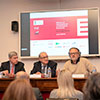 22/01/24
22/01/24The Specialization Course in Economic Information Begins at Nebrija
Eighteen students have embarked on a new academic journey this week, aiming to obtain the Specialization Diploma in Economic Information. Organized by Formación e Información Económica (FIE), this program is part of the School's postgraduate studies. + Information





